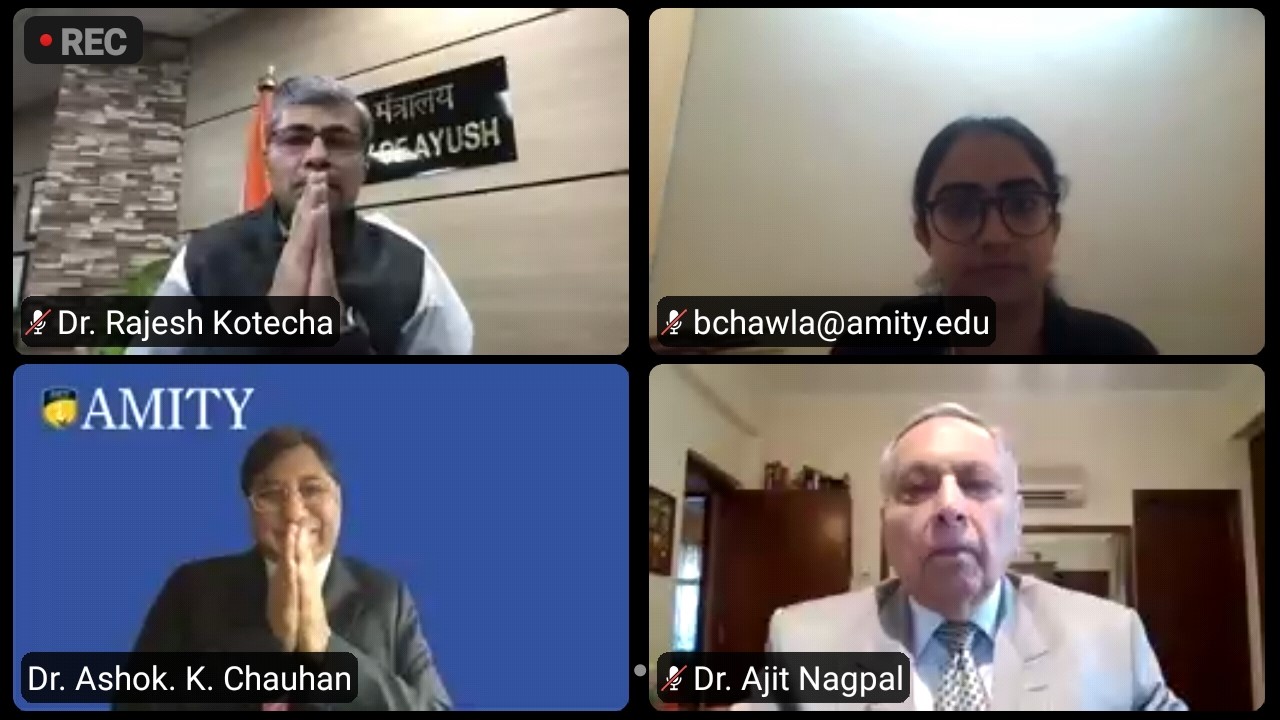Experts call for Advancement of AYUSH for better and Accessible Healthcare at Virtual Training Programme organized by Amity University
New Delhi: A five-day virtual training programme on ‘Traditional Medicine- Modern Approaches for Affordable and Accessible Healthcare’ was inaugurated at Amity University. Organized by Amity Institute of Public health & Amity Institute of Training & Development, the third edition of this training programme is sponsored by Department of Science & Technology (DST). The first two editions of the training were held in February 2019 and February 2020.
Primary aim of this training programme is to impart knowledge about the various disciplines of the traditional Indian Systems of Medicine (AYUSH), namely Ayurveda, Yoga, Unani, Siddha, and Homeopathy, being practiced across the Indian Sub-continent since time immemorial.
Dr. Ashok. K. Chauhan, Founder President, Amity Education Group welcomed the galaxy of guests and speakers to the visionary training programme. He shared that the Indian system of Medicine & traditional medicine is the only solution that needs to be pursued. He stated that AYUSH is transforming the world and announced the creation of an ATOMIC (Attack the Opportunities and Monitor the Implementation and Compliance) AYUSH taskforce to further increase awareness about this science.
Chief Guest for the programme Dr. Rajesh Kotecha, Secretary, Ministry of AYUSH, Government of India averred that there are several myths regarding AYUSH professionals that need to be quashed. He also called for sensitizing future generation about AYUSH and asked the entire scientific fraternity to take this responsibility. Modern advancement is the need of the times & all efforts need to be taken to strengthen this initiative in the language of the common man. He stated that the horizon is vast when it comes to research in AYUSH and called for bringing research from lab to the land for the larger good. He emphasized on the advancement of AYUSH for better and accessible healthcare.
Dr. Nitin Batra, Advisor, AITD, Amity University, Noida averred that traditional medicine system is $80 billion market across the globe & is slated to reach $5 trillion by 2030. He added that depth, personalisation & adoption of medicine will assist in the growth of the market. Purpose-based leadership matters and Dr. Kotecha is an example to be followed as he is working towards improving the quality of life. He asked participants to break the barriers and learn from each other.
Prof. (Dr.) W Selvamurthy, President ASTIF, Amity University, Noida shared that the training programme looked to examine traditional Indian health systems and explore their methodologies and practice; consider how policy and practice link together to support health systems and their sustainability; compare traditional and modern health care systems and understand “medical pluralism” that integrates various health care programs and delivery systems.
31 nodal officers from various Government of India Institutions/Universities are attending the training programme along with participation from senior faculties, research scholars and students of global Amity fraternity. Lectures will be delivered on themes including ‘Traditional medicine: Modern approach to Holistic Health’; ‘Traditional medicine: Modern approach to Holistic Health’; ‘Integrating traditional and modern medicine for Affordable health’; ‘Mind-Body Approach in Healthcare’; ‘AYUSH & Holistic Living (The Ashrama Concept of Life’ among others. Panel discussions were also organized on the theme ‘Ayurveda Medication: The Way Forward’; ‘Unani, Siddha and Homeopathy: Reviving of Indian Roots’; ‘Role of AYUSH to Combat the Global Covid-19 Pandemic: India’s Contribution to Global Health’ et al.
Also present on the occasion were Dr Ajit K Nagpal, Chairman, Board of Governors, Ritnand Balved Medical Foundation; Prof. (Dr.) BC Das, Dean, Faculty of Health & Allied Sciences, Amity University, Noida; Dr. Rajiv Janardhanan, Director, Amity Institute of Public Health and hundreds of students, staff and faculty members.

